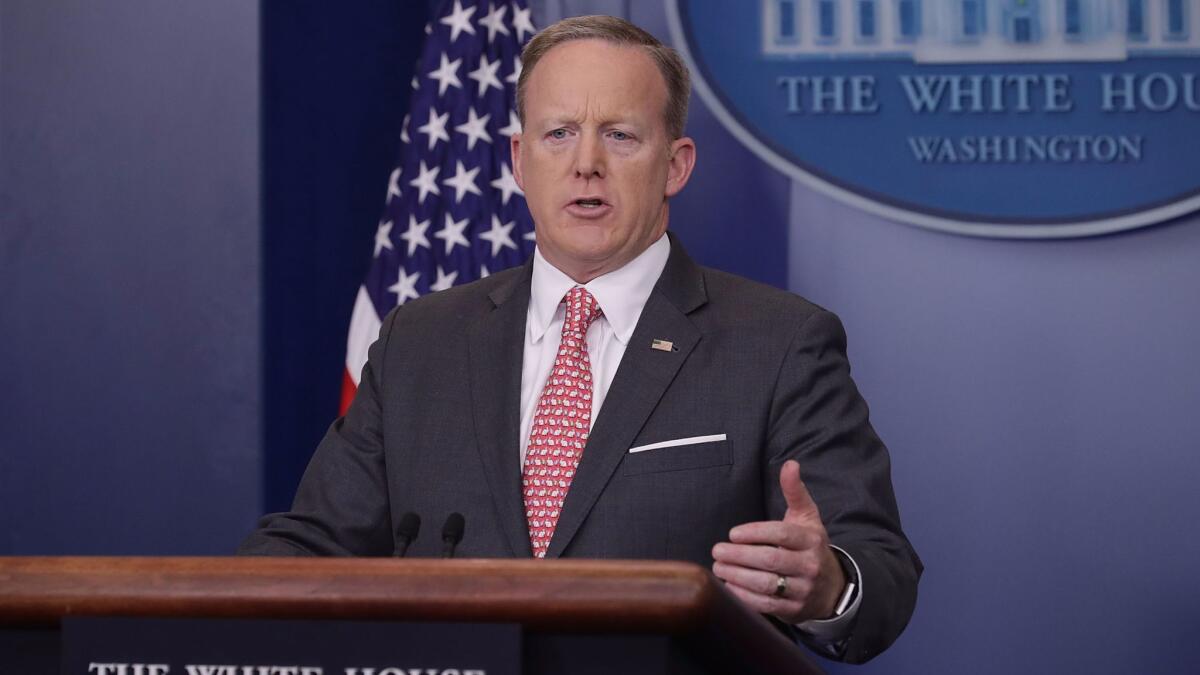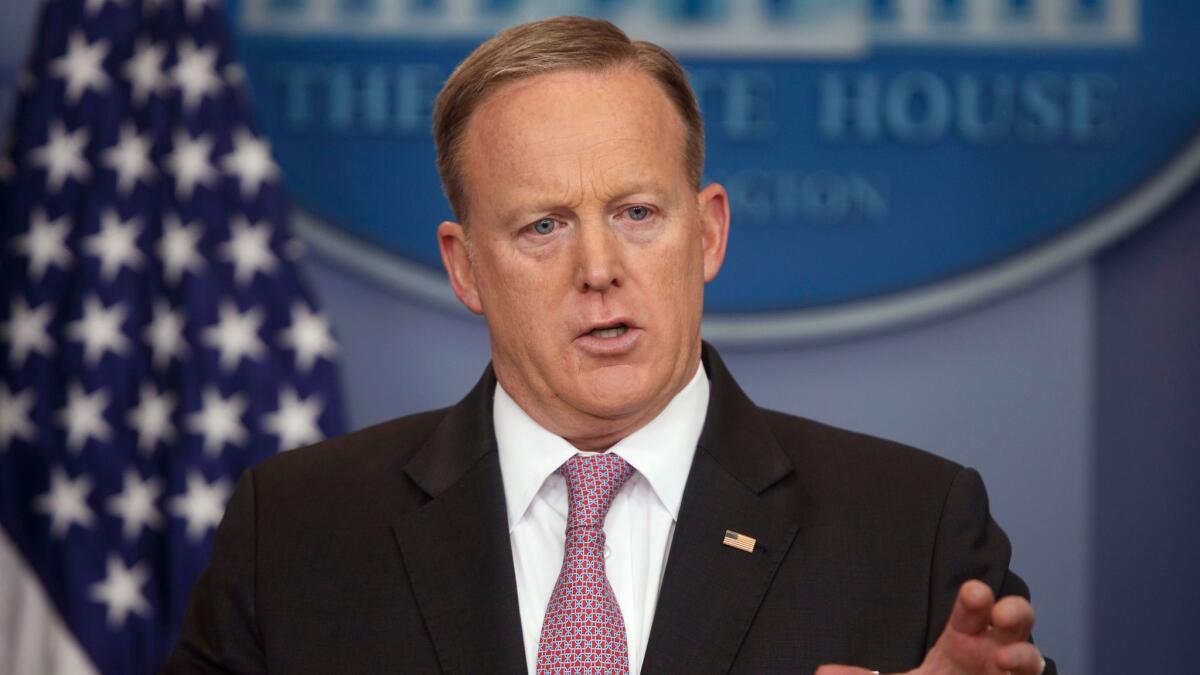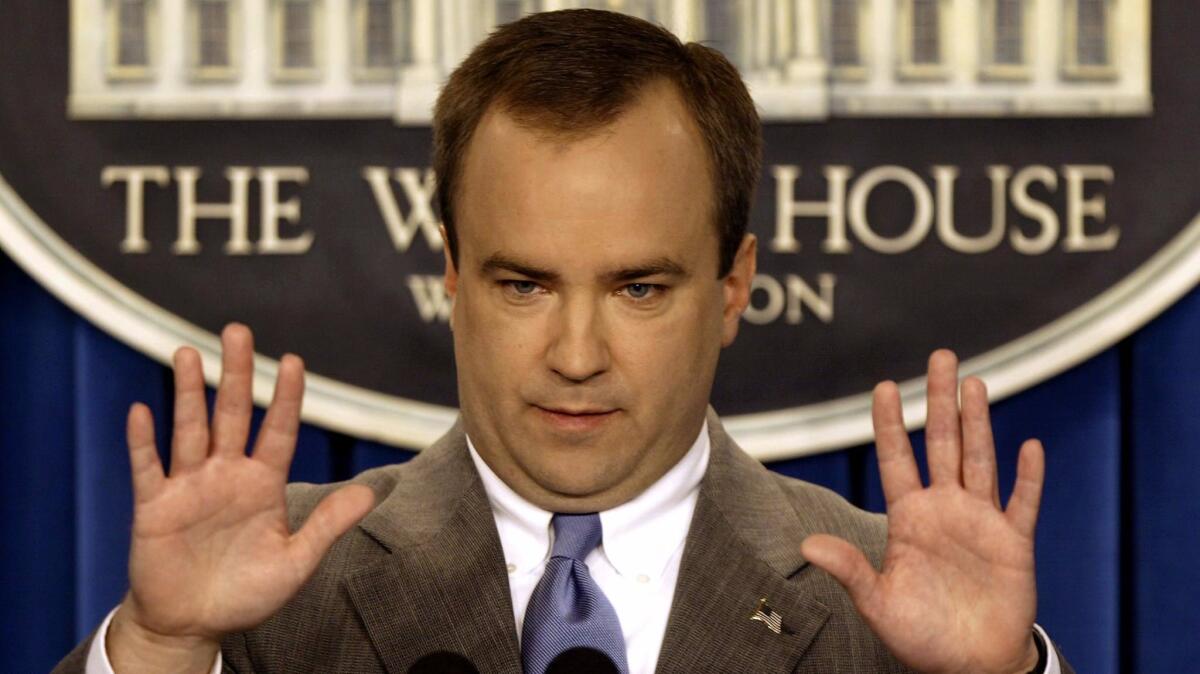Tips for Sean Spicer: Cool down, be truthful and stick to the facts

- Share via
In the 88 years since President Hoover named a former Minneapolis Tribune reporter as the first White House press secretary, nobody who has held that job has stumbled as quickly or dramatically as Sean Spicer.
Millions have gaped at the spectacle of Spicer’s daily briefings on cable news. Melissa McCarthy’s impersonation of him on NBC’s “Saturday Night Live,” most recently in an Easter bunny outfit similar to one he once wore at a White House holiday event, has turned Spicer into an improbable pop-culture figure. She portrays him as a lying buffoon who badgers the press.
By all accounts, the press secretary’s job is hard, and missteps are inevitable. “Even the best trip themselves up,” said Joe Lockhart, who took the job just weeks before President Clinton was impeached in the Monica Lewinsky sex scandal.
Last week, Spicer profusely apologized for saying that Adolf Hitler did not use poison gas against his own people the way Syrian President Bashar Assad did. If it wasn’t the worst blunder of any White House press secretary since 1929, it was close.
But anyone who has held Spicer’s job knows what it feels like to make a gaffe at the White House lectern.
“When you get to a place where it doesn’t sound right, you just literally have to stop, even if it’s uncomfortable, and do a quick damage assessment in your head, and — particularly if it’s not what you meant — take a step back and overtly say, ‘I misspoke there,’” Lockhart said.
The White House Transition Project, a nonpartisan group that helps new administrations organize their takeover of the government, has compiled a list of “lessons learned” from previous press secretaries.

It’s part of a report prepared by the project’s director, Martha Joynt Kumar, also the author of “Managing the President’s Message: The White House Communications Operation.” A few of the key lessons:
Never Lie
“Providing reporters with misinformation is a cardinal sin no matter whether it is willful or unintentional,” Kumar wrote in the report.
In Spicer’s case, that happened his first day on the job, at President Trump’s behest. Spicer harangued reporters for questioning Trump’s untrue statement that his inauguration crowd was the biggest in history. He antagonized the press further by taking no questions.
He also annoyed his boss. Trump reportedly was upset because Spicer wore a baggy suit to the press briefing.
It soon got worse. Spicer defended Trump’s false allegation that millions of immigrants committed voter fraud in November. He stood behind Trump’s unsubstantiated charge that President Obama illegally tapped his phones in Trump Tower. And he touched off a rare diplomatic spat with a key ally when he repeated a Fox News report that British intelligence agents helped Obama bug Trump’s phones, an accusation Britain adamantly denied.
False statements at White House briefings are nothing new.
In 1960, President Eisenhower’s popular Press Secretary James Hagerty shook reporters’ trust when the administration was caught lying about an American U-2 spy plane shot down in the Soviet Union, Kumar recalled in an interview. Eisenhower was forced to admit that the cover story — a NASA weather plane flying over Turkey had drifted off course — was a lie.
Falsehoods about U.S. military action in Southeast Asia dogged press secretaries under Presidents Johnson and Nixon. But the White House spokesman was a less visible public figure in that era. The daily briefings were not televised live by cable networks that draw millions of viewers, and there was no social media to instantly amplify misstatements.
During the Watergate scandal, Press Secretary Ron Ziegler got entangled in a web of lies by the president and his top advisors. Ziegler, who’d dismissed the break-in at Democratic Party headquarters as a “third-rate burglary” and denied any involvement of Nixon’s reelection campaign, famously told reporters in April 1973 that some of his previous statements had become “inoperative.”
Scott McClellan, who was press secretary under President George W. Bush, said in 2007 that he “unknowingly passed along false information” about the role of White House aides in leaking the identity of CIA operative Valerie Plame. McClellan blamed Bush, Vice President Dick Cheney and several top White House aides.
To Kumar, that was no small thing. “I think the most important thing for a press secretary is to be seen as providing credible information, and being knowledgeable of what’s going on in the administration,” she said.
Cool tempered is better than hot tempered
Marlin Fitzwater, press secretary under Presidents Reagan and George H.W. Bush, told Kumar that patience and tolerance were important.
“The tolerance side is you have to tolerate smart people, dumb people, early risers, late risers, early callers, late callers, every kind of physical and personal abuse you can come up with,” Fitzwater told her. “It’s like being a waitress in a restaurant.”

Fitzwater and Clinton Press Secretary Mike McCurry both argued that humor can cool down a tense briefing.
Spicer’s are tense more often than not. Last month, he snapped at veteran White House reporter April Ryan. “Stop shaking your head,” he told her.
The remark drew scathing criticism, so at his briefing the next day Spicer tried to lighten the mood by turning to Ryan for the first question.
“How are you today?” he asked.
“I’m fine, and how are you?” said Ryan, Washington bureau chief of American Urban Radio Networks.
“Fantastic!” Spicer responded to laughter.
Avoid the role of persuader
Press secretaries often come from campaigns or political parties, where their job — like Spicer’s at the Republican National Committee — was not just to share facts with reporters, but to make a persuasive case to them.
McCurry argued that was a bad approach at the White House press office, however common it has become.
“In retrospect, [I] think the whole spin, the propaganda, the looking like you’re trying to spin the politically attractive side of the argument I think is very unsettling,” McCurry told Kumar. “I think it also diminishes the authority that you need to have in that process so people understand this is good information they’re getting.”
Ron Nessen, press secretary under President Ford, said in a phone interview that the most important duty of the press secretary was to meet daily with the president to review what’s in the news.
“My main rule for that job was, I’m the president’s spokesman, and therefore I ought to answer the reporters’ questions as the president would answer them if he were there,” Nessen said. “I’m just speaking for him.”
Live updates from the Trump administration and around Washginton »
Twitter: @finneganLAT
ALSO:
Trump is creating a void on climate change. Can California persuade other states to help fill it?
As Trump and Texas crack down on illegal immigration, Austin rebels
More to Read
Get the L.A. Times Politics newsletter
Deeply reported insights into legislation, politics and policy from Sacramento, Washington and beyond. In your inbox three times per week.
You may occasionally receive promotional content from the Los Angeles Times.











